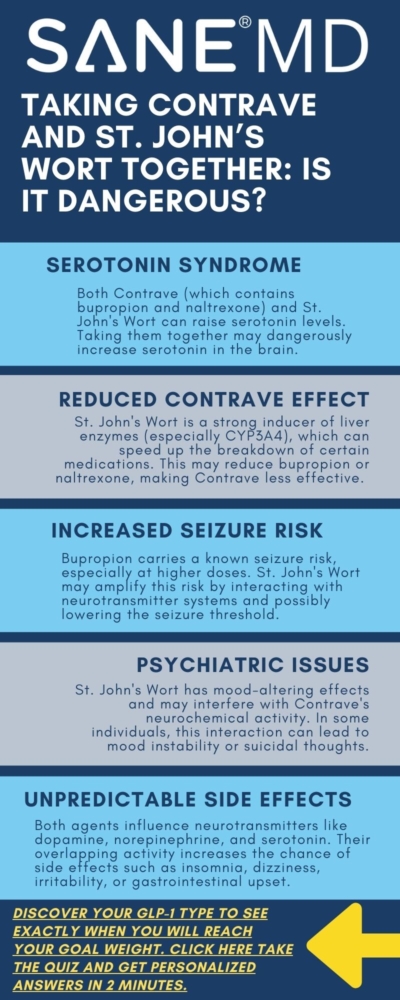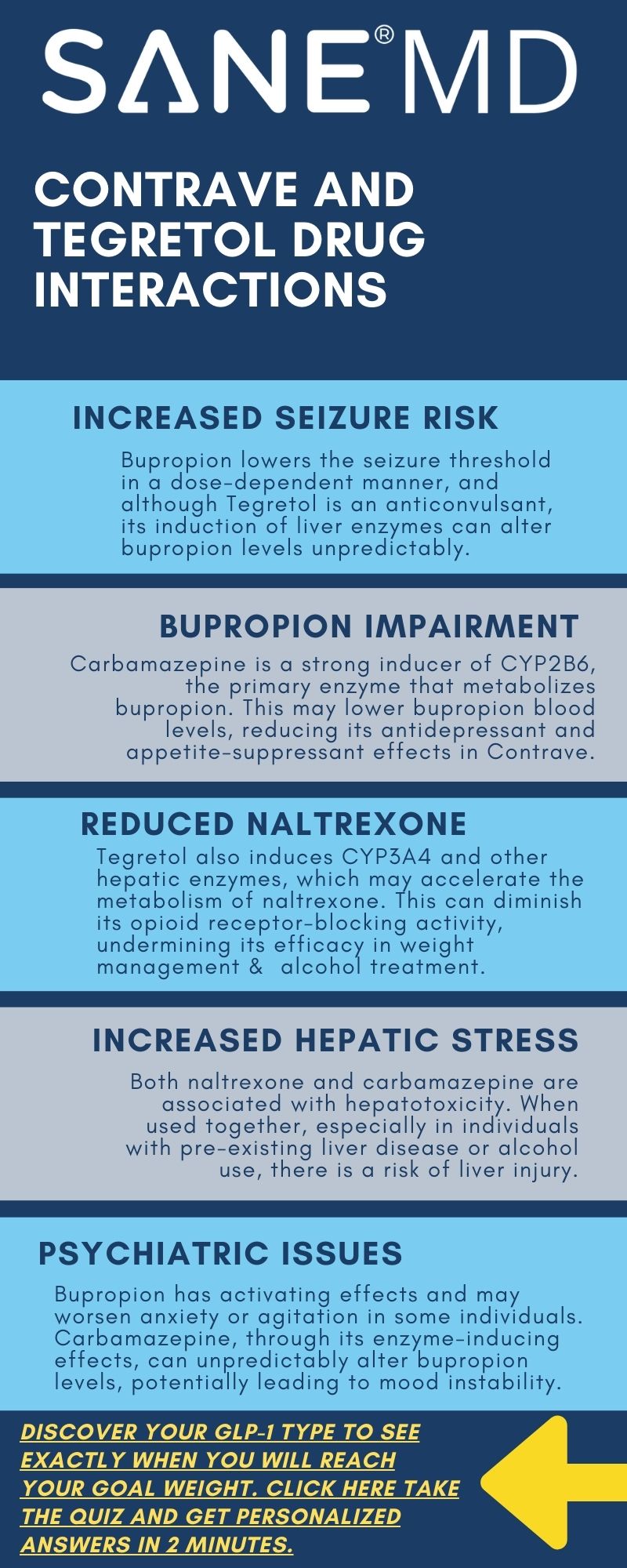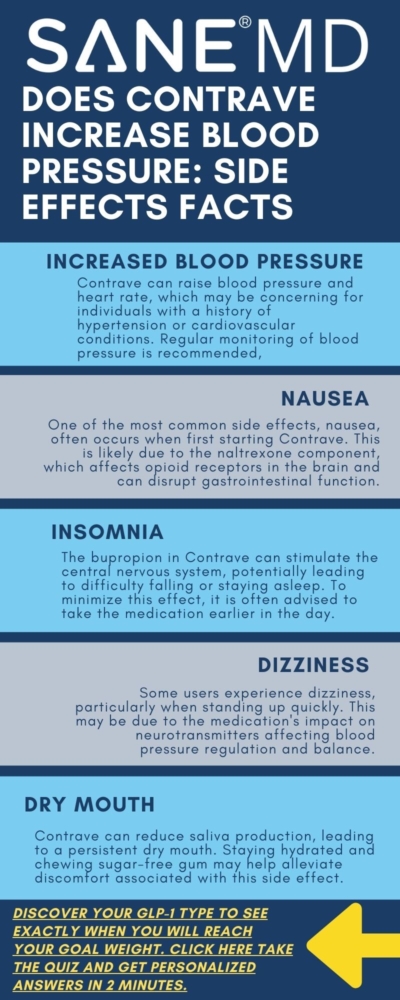Taking Contrave and St. John’s Wort Together: Is it Unsafe?

The rising popularity of prescription weight loss medication like Contrave, combined with the widespread use of herbal remedies such as St. John’s Wort, raises a critical question for patients trying to lose weight safely: Can you take Contrave and St. John’s Wort together, or is it unsafe?
Contrave is a prescription drug that contains two active ingredients—bupropion and naltrexone—designed to help regulate appetite and influence the brain’s reward pathways. St. John’s Wort, on the other hand, is a widely available herbal supplement often used to treat depression and mood disorders by increasing serotonin levels. While both substances affect the central nervous system, using them together may pose serious health risks, especially in people with preexisting medical conditions like bipolar disorder, seizure disorders, or high blood pressure.
“Many patients are unaware that mixing prescription weight loss drugs with certain dietary supplements can result in potentially life-threatening interactions,” says Dr. Matthew Olesiak, Chief Medical Director of SANE MD. “This is especially true with compounds that affect serotonin levels, like St. John’s Wort.”
Understanding how these two drugs interact—alongside the potential consequences—is crucial for anyone considering taking Contrave and St. John’s Wort together.
Key Takeaways
- Taking Contrave and St. John’s Wort together may significantly increase the risk of serotonin syndrome, a potentially life-threatening condition caused by excessive serotonin in the brain.
- Patients with underlying medical conditions such as seizure disorders, high blood pressure, or liver disease are at an even higher risk of serious drug interactions.
- Always consult your healthcare provider before combining prescription medications with over-the-counter supplements or other drugs.
Understanding Contrave
Contrave combines sustained-release bupropion and extended-release naltrexone—two drugs that target appetite regulation and the brain’s reward pathways to support weight loss for certain individuals. Bupropion is also used in smoking cessation and as an antidepressant, while naltrexone is typically used to manage alcohol and opioid dependence.
The way bupropion affects dopamine and norepinephrine makes it a unique prescription weight loss medication. However, it also lowers the seizure threshold, which can increase the risk of seizures—especially when combined with other drugs or supplements that affect serotonin or the central nervous system.
People with a history of seizure disorders, eating disorders, or those who drink alcohol excessively may face an increased risk when using Contrave. The medication guide also warns against abrupt discontinuation, as it may cause mood destabilization and other withdrawal symptoms. Weight gain may also occur.
What Is St. John’s Wort?
St. John’s Wort (Hypericum perforatum) is an herbal supplement commonly used to treat depression, mood swings, and mild anxiety. It influences neurotransmitters like serotonin, dopamine, and norepinephrine, similar to selective serotonin reuptake inhibitors (SSRIs) and serotonin-norepinephrine reuptake inhibitors (SNRIs).
Because of its wide-ranging effects on the brain, St. John’s Wort is known to interact with many other medications. These drug interactions may affect everything from the liver’s ability to metabolize drugs to serotonin levels in the brain.
Despite being classified as a dietary supplement, St. John’s Wort is a potent compound and should never be considered harmless—especially when used with other medications.
Why Taking Contrave and St. John’s Wort Together Is Risky
Combining two drugs that influence serotonin—like Contrave and St. John’s Wort—can increase the risk of serotonin syndrome, a rare but potentially fatal condition marked by confusion, agitation, tremors, sweating, high blood pressure, and trouble breathing.
This is especially concerning for compatible patients taking Contrave for weight loss, as many may not realize that bupropion can amplify serotonin activity indirectly. When paired with another serotonergic agent, the effects may be compounded.
“Most healthcare providers warn against combining serotonergic medications with herbal supplements like St. John’s Wort because of the increased risk of serotonin syndrome,” says Dr. Olesiak. “It’s essential to inform your doctor about all the medications and supplements you take—even those you consider harmless.”
St. John’s Wort can also accelerate the metabolism of bupropion and naltrexone in the liver, reducing their effectiveness and altering the drug’s intended balance. This not only reduces the drug’s weight loss benefits but may also contribute to unusual symptoms like irritability, sleep disturbances, or dry mouth.
Additionally, combining these two drugs may:
- Increase the risk of hypertensive crisis, especially in those with high blood pressure or on monoamine oxidase inhibitors (MAOIs).
- Trigger mood destabilization in individuals with bipolar disorder or other mood disorders.
- Elevate seizure risk in people with existing seizure disorders or those prone to abrupt discontinuation of medications.
Drug Interactions: What You Need to Know
When it comes to weight loss drugs, drug interactions are a critical factor in patient safety. Contrave, because it combines two active agents—sustained release bupropion and extended release naltrexone—has a particularly high potential for drug interactions with both prescription medications and over-the-counter medications.
The way these components work—affecting dopamine, norepinephrine, and the brain’s reward pathways—makes it essential to screen for other compounds that might amplify, diminish, or dangerously alter their effects.
One such compound is St. John’s Wort. While often perceived as a natural remedy for mood disorders or to treat depression, it’s far from benign when taken with prescription medications. St. John’s Wort has a well-documented history of interfering with liver enzymes (particularly CYP3A4), which break down many medicines in the body. This can lead to increased risk of drug toxicity or decreased drug efficacy.
St. John’s Wort is known to interfere with many other drugs, including:
- Antidepressants such as tricyclic antidepressants, selective serotonin reuptake inhibitors (SSRIs), and serotonin norepinephrine reuptake inhibitors (SNRIs) – potentially leading to serotonin syndrome, especially when combined with bupropion in Contrave.
- Birth control pills – reducing their effectiveness and increasing the risk of unintended pregnancy. (Contrave may also reduce the effectiveness of hormonal birth control._
- Blood thinners like warfarin – which can lead to either excessive bleeding or clotting.
- Immunosuppressants such as cyclosporine – lowering blood levels and potentially causing organ rejection.
- Antiepileptics – which may become less effective, raising the risk of seizures in those with seizure disorders.
Additionally, Contrave itself interacts with a broad range of certain medications. These include:
- Monoamine oxidase inhibitors (MAOIs) – the combination can result in a hypertensive crisis or other potentially life-threatening conditions.
- Mood stabilizers – which may be affected by the dopaminergic and noradrenergic activity of bupropion.
- Medications that affect the central nervous system, including sedatives, stimulants, and antipsychotics, including Haldol.
When patients take other medications alongside Contrave or St. John’s Wort, the potential drug interactions multiply. These combinations don’t just alter effectiveness—they can drastically increase the risk of adverse events like high blood pressure, skin rash, unusual symptoms, or mood swings.
The central nervous system is especially sensitive to overlapping influences from multiple drugs. Combining two drugs like Contrave and St. John’s Wort, both of which have psychoactive properties, places extra strain on neurotransmitter balance and regulatory systems in the body. These risks are amplified in patients with underlying medical conditions such as bipolar disorder, liver disease, or those who drink alcohol regularly.
Many people also mistakenly believe that if a supplement is “natural,” it can be used freely. But dietary supplements like St. John’s Wort can pose just as many risks as synthetic drugs when it comes to interactions—especially with a prescription weight loss medication.
Combining bupropion with herbal supplements like St. John’s Wort can lead to significant drug interactions. According to the FDA, St. John’s Wort is known to interact with various cytochrome P450 enzymes and transporter systems, which can alter the metabolism of many drugs, including bupropion . Additionally, a study published in the British Journal of Clinical Psychopharmacology reported a case where the concurrent use of bupropion and St. John’s Wort resulted in prolonged oro-facial dystonia, highlighting the potential for serious neurological side effects .
Therefore, it is crucial to consult with a healthcare provider before combining bupropion with any herbal supplements to avoid adverse effects.
In practice, this means that healthcare providers must conduct a thorough medication review before prescribing Contrave—and patients must be honest and proactive in disclosing all the medications and supplements they’re taking, including herbal remedies like St. John’s Wort.
Even a single unreported supplement can result in an increased risk of life-threatening conditions or reduce the effectiveness of medications meant to help you lose weight and improve your health.
Health Conditions That Increase the Risk
Individuals with certain medical conditions should be especially cautious—or avoid entirely—taking Contrave and St. John’s Wort together. While each substance has legitimate therapeutic uses, combining them can pose a serious health risk, particularly in vulnerable populations.
Below are the key conditions that raise the increased risk of dangerous drug interactions and complications:
- Seizure disorders: Contrave contains bupropion, which is known to lower the seizure threshold. When combined with other substances that stimulate the central nervous system, such as St. John’s Wort, the chance of a seizure increases dramatically. This makes the drug combination unsuitable for individuals with a current or past history of epilepsy or other seizure disorders.
- Bipolar disorder: Both bupropion and St. John’s Wort can influence mood and neurotransmitter balance. While bupropion is sometimes used to treat depression, it may trigger mood destabilization or manic episodes in people with bipolar disorder. St. John’s Wort, due to its serotonergic properties, may also disrupt mood regulation, especially when combined with other antidepressants or central nervous system stimulants.
- Liver disease or kidney disease: Both Contrave and St. John’s Wort are metabolized through hepatic (liver) and renal (kidney) pathways. People with liver disease or kidney disease may experience slower drug clearance, leading to an increased risk of accumulation and toxicity. The altered metabolism can intensify side effects or reduce the expected therapeutic effect of either drug.
- Heart disease or high blood pressure: Naltrexone and bupropion can increase blood pressure, and when paired with a substance like St. John’s Wort—which may alter drug metabolism and central neurotransmission—this effect may become exaggerated. The combination raises the risk of hypertensive crisis, especially in individuals already diagnosed with high blood pressure or any form of heart disease.
- Eating disorders: Individuals with a history of eating disorders (especially bulimia or anorexia nervosa) are at heightened risk when using bupropion, as this population is more prone to seizure disorders and mood disturbances. Adding St. John’s Wort—often perceived as a natural mood booster—can further destabilize mood or contribute to dangerous behavior if not closely monitored.
For patients with an initial body mass index (BMI) of 30 or higher—or 27 with associated comorbidities such as high blood pressure—Contrave may be recommended as part of a supervised treatment plan to lose weight. However, the increased risk posed by certain underlying health conditions must be weighed carefully against the potential benefits of weight loss.
Even among healthy volunteers, clinical trials have demonstrated that bupropion, when used alongside other serotonergic agents, can produce symptoms of serotonin syndrome and central nervous system overstimulation—ranging from mild (anxiety, agitation) to severe (confusion, muscle rigidity, or fever).
In these cases, the presence of any preexisting medical condition can amplify the potentially life-threatening conditions associated with polypharmacy. This is why healthcare providers emphasize the importance of medical history screening before initiating prescription weight loss medication, particularly one like Contrave that carries a range of neurological and cardiovascular precautions.
By openly discussing all current health issues and medications—including dietary supplements like St. John’s Wort—patients can reduce their increased risk of adverse outcomes and receive more personalized, safer care.

What About Over-the-Counter Medications?
Many people assume that over-the-counter medications and herbal supplements are inherently safe, especially when compared to prescription drugs. But this assumption can be dangerous—particularly when these products are taken alongside prescription weight loss medication like Contrave.
One of the most well-known examples is St. John’s Wort, which is commonly used to treat depression, relieve anxiety, and support mood balance. Despite being marketed as a natural remedy, St. John’s Wort is far from harmless when combined with other medications.
In fact, St. John’s Wort is associated with a wide range of potential drug interactions, many of which are serious. It significantly affects the activity of liver enzymes, particularly CYP3A4, which are responsible for metabolizing many commonly used drugs—including antidepressants, anticonvulsants, birth control pills, and weight loss drugs.
This enzyme-inducing effect can lead to reduced efficacy of medications, rendering them less effective or entirely ineffective. In other cases, it may enhance drug activity to dangerous levels, contributing to increased risk of side effects or toxicity.
For instance, the NIH reports that St. John’s Wort can:
- Decrease the effectiveness of oral contraceptives, leading to unintended pregnancy. (Contrave may also decrease the effectiveness of hormonal birth control.)
- Weaken the effects of immunosuppressants like cyclosporine, potentially leading to organ rejection
- Interfere with HIV medications, making viral suppression less effective
- Contribute to serotonin syndrome when taken with serotonergic medications such as SSRIs, SNRIs, or bupropion therapy
- Trigger unusual symptoms like skin rash, sun sensitivity (photosensitivity), dizziness, or confusion—especially when combined with other central nervous system stimulants
Because of these effects, even a seemingly innocent supplement can interact dangerously with Contrave, especially considering its influence on dopamine, appetite regulation, and brain function. Patients who drink alcohol, have bipolar disorder, or are managing multiple medical conditions face a particularly higher risk when mixing unverified supplements with prescription treatments.
The takeaway is simple but critical: just because a product is available without a prescription does not mean it’s free from health risks or compatible with your current medications.
Before starting any dietary supplement, herbal remedy, or over-the-counter medication, patients using Contrave should speak with a qualified healthcare provider to avoid dangerous drug interactions and protect their progress toward weight loss and overall health.
Lifestyle Considerations While Taking Contrave
When using Contrave as part of a treatment plan for weight loss, it’s important to understand that the medication is not a quick fix. Its effectiveness hinges on several critical lifestyle elements, including a reduced-calorie diet, consistent physical activity, and medical supervision. These foundational strategies help support long-term behavior change and maximize the benefit of prescription weight loss medication.
Adding unregulated dietary supplements like St. John’s Wort into this mix, however, may not only diminish the benefits of Contrave but also increase the likelihood of adverse effects and serious drug interactions. Herbal compounds can alter how Contrave is absorbed, metabolized, and excreted—ultimately throwing off the drug’s delicate balance within the central nervous system.
Here are some key considerations to ensure you’re using Contrave safely and effectively:
- Avoid high-fat meals when taking Contrave. A high-fat meal can significantly increase the plasma concentration of sustained-release bupropion, raising the likelihood of side effects such as high blood pressure, nausea, or even triggering a seizure in at-risk individuals. Stick with balanced meals that are nutrient-dense and aligned with your reduced-calorie diet goals.
- Do not abruptly discontinue Contrave. Stopping the medication suddenly—especially without the guidance of a healthcare provider—can lead to mood destabilization, irritability, or withdrawal symptoms. If side effects arise or the medication no longer seems effective, work with your provider to taper off safely.
- Be cautious about missed doses. It may be tempting to take an extra pill to “make up” for a missed dose, but this approach increases the risk of seizure disorders, elevated blood pressure, and other complications. Follow the instructions in your medication guide or speak to your healthcare provider about the safest course of action.
- Report any unusual symptoms immediately. This includes persistent dry mouth, dizziness, confusion, agitation, sleep problems, or sudden mood swings. These symptoms may indicate a drug interaction, especially if you’re also using St. John’s Wort or other over-the-counter medications.
- Limit alcohol consumption. Patients using Contrave should not drink alcohol excessively. Alcohol can increase the risk of seizures and central nervous system side effects, particularly in individuals with a history of bipolar disorder, depression, or those prone to abrupt discontinuation of mood-altering medications. For some, complete abstinence may be recommended during bupropion therapy.
- Watch for interaction with physical exertion. Because Contrave affects neurotransmitters involved in energy, reward, and impulse control, combining the drug with intense physical activity may amplify sensations like racing heart or dizziness—especially in warmer environments. Stay hydrated, monitor your blood pressure, and pace workouts according to your tolerance level.
- Keep your provider informed about all the medications and supplements you’re taking. Even a well-intentioned supplement like St. John’s Wort can undermine your weight loss efforts by causing potential drug interactions that interfere with how Contrave works—or worse, lead to a potentially life-threatening condition like serotonin syndrome or hypertensive crisis.
While many people are motivated to lose weight quickly, using multiple substances that act on the brain and body simultaneously should never be done without guidance. Combining two drugs—particularly those with serotonergic, dopaminergic, or stimulant-like properties—can tax the brain involved in mood regulation, appetite control, and impulse moderation.
It’s also worth noting that patients with a history of eating disorders, seizure disorders, or mood disorders are more susceptible to complications, including unusual symptoms and serious medical conditions. That’s why lifestyle choices and honest communication with your healthcare provider are critical throughout the course of treatment.
Making well-informed choices, staying consistent with your reduced-calorie diet and physical activity, and avoiding unapproved supplements can help maximize Contrave’s benefits and reduce your increased risk of complications.
When to Seek Immediate Medical Attention
Call your healthcare provider immediately or seek emergency care if you notice signs of:
- Serotonin syndrome: confusion, rapid heartbeat, sweating, tremors
- Hypertensive crisis: severe headache, chest pain, blurred vision. Check out our guide to discover if Contrave can increase blood pressure — and why.
- Allergic reaction: hives, swelling, or trouble breathing
- Mood swings or signs of manic behavior in bipolar individuals
These symptoms may indicate that your medications—or dietary supplements—are interacting in dangerous ways.
Can You Ever Safely Take Contrave and St. John’s Wort?
There may be cases where low-dose, short-term use of St. John’s Wort is considered, but this should only be done under the direction of a healthcare provider familiar with all the medications you’re taking.
In most cases, patients seeking mood support should explore safer alternatives, especially since Contrave itself is contraindicated in patients currently being treated with monoamine oxidase inhibitors, tricyclic antidepressants, or serotonergic agents.
Frequently Asked Questions (FAQ)
When it comes to combining prescription weight loss medication like Contrave with dietary supplements or antidepressants, it’s natural to have concerns.
The following FAQs address some of the most common questions about drug interactions and safety when using Contrave, bupropion, St. John’s Wort, and other medications that affect the central nervous system.
1. Can I take St. John’s Wort with bupropion?
It is generally not recommended to take St. John’s Wort with bupropion due to the increased risk of serious drug interactions. Both substances influence brain neurotransmitters and may lead to serotonin syndrome, a potentially life-threatening condition. St. John’s Wort can also induce liver enzymes that alter how bupropion is metabolized, reducing its effectiveness or increasing side effects.
Patients treated with bupropion should consult their healthcare provider before using any herbal supplements, including St. John’s Wort.
2. What medications should not be taken with Contrave?
Contrave should not be taken with monoamine oxidase inhibitors (MAOIs) like Nardil, other bupropion-containing medications, opioids like hydromorphone, or drugs like Wellbutrin that lower the seizure threshold.
Combining Contrave with other medications that affect serotonin—such as SSRIs, SNRIs, or St. John’s Wort—can increase the risk of serotonin syndrome. Individuals with seizure disorders, eating disorders, or those who drink alcohol heavily are especially vulnerable to complications.
Always review your current prescriptions, supplements, and over-the-counter medications with your healthcare provider before starting Contrave.
3. What drugs should not be taken with St. John’s Wort?
St. John’s Wort can interfere with a wide range of medications, including antidepressants (SSRIs, SNRIs, tricyclic antidepressants), birth control pills, blood thinners, and immunosuppressants. It may reduce drug effectiveness by speeding up liver metabolism and increase the chance of adverse effects by amplifying serotonin activity. When taken with serotonergic drugs, it may lead to serotonin syndrome.
People taking prescription weight loss drugs, mood stabilizers, or treatments for heart disease, bipolar disorder, or seizure disorders should avoid using St. John’s Wort without medical supervision.
4. Can you take Contrave with an SSRI?
Using Contrave with a selective serotonin reuptake inhibitor (SSRI), such as Prozac and Zoloft, can be risky due to the potential for drug interactions affecting serotonin levels. Since Contrave includes bupropion, which can indirectly influence serotonin, adding an SSRI may increase the risk of serotonin syndrome.
This risk is higher in patients with bipolar disorder, those who have high blood pressure, or who are already taking other serotonergic drugs or supplements like St. John’s Wort.
Your healthcare provider may recommend an alternative treatment plan or close monitoring if both are prescribed.
Summary: The Risks Outweigh the Benefits
Using Contrave and St. John’s Wort together can increase the risk of serious drug interactions, including serotonin syndrome, seizure, mood instability, and reduced medication effectiveness. For patients trying to lose weight with Contrave, the risks of combining it with herbal antidepressants far outweigh any potential benefits.
Your best bet is to work closely with your healthcare provider to develop a comprehensive, safe treatment plan that includes a reduced-calorie diet, physical activity, and the right medications for your needs.
References
British Journal of Clinical Pharmacology

Contrave and Tegretol Drug Interactions: Dangerous Duo?

Combining medications often presents a complex challenge for healthcare providers and patients alike. When two potent drugs—such as Contrave and Tegretol—are used together, the potential for harmful outcomes increases. While both medications are beneficial for their approved uses, their interaction raises concern. Understanding the risks associated with Contrave and Tegretol drug interactions is crucial for safe and effective treatment.
Contrave, a combination of naltrexone and bupropion, is FDA-approved for chronic weight management. Tegretol (carbamazepine), on the other hand, is an anticonvulsant commonly used to treat seizure disorders and bipolar disorder. Each drug affects the central nervous system in distinct ways, and when taken together, they can cause serious complications.
Key Takeaways
- Combining naltrexone and bupropion with Tegretol can increase the risk of seizures, liver damage, and diminished drug effectiveness.
- Tell your doctor about all other medications you take before starting Contrave, especially if you are already using an anticonvulsant like Tegretol.
- Monitor for signs of allergic reaction, chest pain, or changes in mental health, and seek medical attention immediately if these occur.
How Contrave Works
Contrave contains two active ingredients: naltrexone and bupropion. Naltrexone blocks opioid receptors and helps reduce cravings, while bupropion, an atypical antidepressant, is also marketed as Wellbutrin XL to treat depression and assist with smoking cessation. Together, they help control appetite and reduce the urge to overeat for certain individuals when combined with a reduced-calorie diet.
Contrave is used for weight control in overweight or obese individuals. It promotes behavioral changes, helping to reduce calorie intake, especially for those who need to lose weight and improve overall health outcomes. However, because naltrexone and bupropion affect the brain’s neurotransmitter systems, the drug can have notable mental health effects, including changes in mood, panic attacks, and even suicidal thoughts in rare cases.
How Tegretol Works
Tegretol’s active ingredient, carbamazepine, belongs to the drug class of anticonvulsants. It is used primarily for managing seizure disorder, bipolar disorder, and trigeminal neuralgia. Tegretol stabilizes electrical activity in the brain but also induces liver enzymes, which can speed up the metabolism of certain medications, including bupropion.
This hepatic enzyme induction means that Tegretol may lower the effectiveness of naltrexone and bupropion, making Contrave treatment less effective.
Dr. Matthew Olesiak, Chief Medical Director at SANE MD, explains:
“Tegretol can significantly alter how Contrave is metabolized, which may reduce the drug’s efficacy and raise the risk of adverse side effects such as seizures or liver toxicity.”
Major Risks of Combining Contrave and Tegretol
1. Seizure Risk
One of the most significant concerns with combining Contrave and Tegretol is the increased risk of seizures. According to the FDA, bupropion—one of the active ingredients in Contrave—lowers the seizure threshold in a dose-dependent manner, with seizure incidence rising from approximately 0.1% at 300 mg/day to about 0.4% at 400 mg/day. The risk increases substantially at doses above the recommended maximum. This risk is heightened in individuals with additional predisposing factors, including a history of seizures, eating disorders (such as bulimia or anorexia nervosa), head trauma, or recent alcohol use or withdrawal.
Tegretol (carbamazepine), although commonly prescribed to manage seizure disorders, complicates this interaction. As the FDA notes, carbamazepine is a potent enzyme-inducing antiepileptic drug that accelerates the metabolism of other medications, including bupropion, which may initially lower bupropion blood levels (FDA, 2021). However, if Tegretol is abruptly discontinued, this enzyme-inducing effect diminishes quickly, potentially resulting in an unexpected spike in bupropion levels. This pharmacokinetic shift can elevate seizure risk, especially in patients on extended-release formulations or higher maintenance doses of bupropion.
The FDA further warns in the Contrave medication guide that bupropion should not be used in patients with a seizure history, those with active or past eating disorders, or anyone undergoing abrupt discontinuation of alcohol or sedatives. It also cautions against combining bupropion with other medications or supplements that may cause electrolyte imbalance or central nervous system stimulation, as these may further increase the risk of seizures (FDA Contrave Medication Guide, 2022).
Dr. Matthew Olesiak, Chief Medical Director at SANE MD, explains:
“Patients with a history of seizures or those taking medications that affect seizure threshold must be evaluated carefully before starting Contrave. This includes assessing for eating disorders, alcohol use, and other medications that could interact with naltrexone and bupropion.”
2. Liver Toxicity
Liver disease poses another critical risk in patients taking Contrave and Tegretol together. Both naltrexone and bupropion undergo extensive hepatic metabolism, making the liver a central player in their pharmacokinetics. According to the FDA, naltrexone is primarily metabolized in the liver and carries a warning for hepatotoxicity, particularly at higher doses. Similarly, bupropion is metabolized by cytochrome P450 enzymes, notably CYP2B6, which makes it vulnerable to interactions with enzyme-inducing drugs.
Tegretol (carbamazepine), as noted by the FDA, is a strong inducer of hepatic enzymes, especially CYP3A4. This enzymatic activity not only accelerates its own metabolism but also affects the breakdown of other medications, including bupropion and potentially naltrexone. A study published in Drug Metabolism and Disposition confirms that carbamazepine significantly increases the expression of hepatic enzymes responsible for metabolizing a wide range of substrates, which may reduce drug efficacy (NCBI, 2020).
In individuals with existing liver disease or those taking nutritional supplements processed by the liver, this enzyme induction can overwhelm hepatic pathways. According to the FDA, naltrexone use has been associated with hepatic enzyme elevations and, in rare cases, clinically significant liver injury. Liver toxicity may manifest as dark urine, pale stools, jaundice, or elevated liver enzymes—early signs that must be addressed promptly.
Because naltrexone blocks opioid receptors and bupropion is a dopamine-norepinephrine reuptake inhibitor, both medications can increase hepatic stress, especially when taken alongside other hepatotoxic agents like carbamazepine. The FDA warns that bupropion should be used with caution in patients with hepatic impairment due to the potential for accumulation and toxicity. In rare but serious cases, patients may experience life-threatening liver failure—particularly if alcoholic beverages are consumed regularly or if extended-release formulations like Wellbutrin XL are used concurrently.
Patients should notify their doctor immediately if they experience symptoms suggestive of liver dysfunction. This includes those with a history of alcohol abuse, recent alcohol intake, or concurrent use of over-the-counter products that may tax the liver’s capacity.
3. Reduced Effectiveness of Contrave
The ability of Tegretol to induce liver enzymes can result in significantly reduced plasma concentrations of both naltrexone and bupropion. This effect may not cause immediate symptoms but can seriously compromise the effectiveness of Contrave as a weight loss drug.
Patients who are trying to lose weight with Contrave often rely on its ability to suppress appetite and modulate the brain’s reward system. However, when the parent drug is metabolized too quickly, therapeutic levels may not be reached. This can lead to disappointing results—even if the patient is adhering to a reduced-calorie diet and regular dosing schedule.
The result is not only reduced weight loss but possibly a higher likelihood of noncompliance, treatment failure, or risk-taking behavior such as increasing the dose unsafely. Additionally, consuming high-fat foods during contrave treatment may increase plasma concentrations unpredictably, potentially leading to side effects like chest pain, eye pain, joint pain, or mood changes.
4. Cardiovascular Concerns
Contrave is associated with increased blood pressure and heart rate—especially during the initial phase of starting treatment. For patients with high blood pressure, which is already common in those with obesity or metabolic syndrome, this can introduce cardiovascular strain.
When Tegretol is added to the mix, the interaction becomes harder to predict. While Tegretol itself is not primarily cardiostimulatory, its impact on hepatic metabolism could modify how Contrave behaves in the body, especially if doses are not well controlled.
This raises the risk for chest pain, palpitations, or arrhythmias, unexplained spikes in blood pressure, episodes of dizziness, fainting, or trouble breathing
Tell your doctor if you have a history of cardiovascular disease, are using certain beta blockers, or have experienced panic attacks or mental health changes during past medication trials. Monitoring blood pressure consistently throughout Contrave treatment is crucial for avoiding complications.
Additional Safety Considerations
Combining naltrexone and bupropion with other treatments like Tegretol requires close attention to underlying conditions, drug combinations, and individual health history.
Here are several crucial precautions that patients and healthcare providers must not overlook:
1. Mental Health History
Tell your doctor if you have a current or past history of mental health disorders, including bipolar disorder, depression, or panic attacks. Starting Contrave treatment in these populations can increase the risk of mental health changes, such as mood swings, emotional instability, or the emergence of suicidal thoughts or behaviors—especially in younger adults or individuals with a prior psychiatric history.
The medication guide and boxed warning alerts doctors to monitor for these potential effects, particularly during the first few weeks of therapy or following any dosage adjustment. Behavioral red flags—like agitation, hostility, insomnia, or impulsivity—should be reported to your doctor or pharmacist immediately. In some cases, discontinuation of the drug may be necessary to prevent serious injury.
2. Alcohol Use and Withdrawal Risk
Patients who drank alcohol regularly or who have suddenly stopped drinking alcohol are at an elevated risk for seizures when starting medications like naltrexone and bupropion. Alcohol affects GABA and glutamate activity in the brain, and abrupt withdrawal can lead to neurological instability. Since bupropion independently lowers the seizure threshold, the combination of withdrawal and medication may create a dangerous interaction.
Even if you don’t consider yourself a heavy drinker, it’s essential to tell your doctor about your history of alcohol consumption, as well as any recent changes. In many cases, a lower starting dose or delayed initiation of Contrave may be safer until alcohol has fully cleared from your system. You can learn more about how long Contrave stays in your system in our detailed guide.
3. Use with Beta Blockers and CNS-Active Drugs
Combining naltrexone and bupropion with certain beta blockers, sedatives, stimulants, or other drugs that impact the central nervous system may increase the likelihood of side effects and serious warning signs.
These include:
- Eye pain or visual disturbances
- Joint pain or muscle rigidity
- Trouble breathing or shortness of breath
- Sudden chest pain or heart palpitations
These symptoms may indicate cardiovascular strain, neurological instability, or even an allergic reaction. If you experience any of these, seek care from your provider or your local emergency number right away.
4. Medication Adherence and Lab Results
Stick to your regular dosing schedule. If you miss a dose, don’t double up—just take the next dose as prescribed. Skipping or overdosing can result in missed dose complications, altered blood levels, or a spike in side effects like nausea, agitation, or dizziness.
Patients should also inform their provider of any unusual lab findings. Bupropion and Tegretol have both been associated with false-positive results on lab tests for amphetamines or opioids. Ongoing use may also alter liver enzyme panels and metabolic screenings or even affect lab tests involving hormone levels or kidney function.
5. Read Medication Literature Thoroughly
Always review the patient package insert and medication guide that come with your prescriptions. These documents offer vital insights on drug timing, food interactions (e.g., high-fat foods), possible allergic reaction symptoms like skin rash or dark urine, and what to avoid while undergoing Contrave treatment. They also explain what to do in cases of accidental overdose or signs of opioid withdrawal if opioids have been used recently.
Staying informed is one of the best ways to protect your health and make the most of prescribed Contrave therapy—especially when it’s combined with other medications like Tegretol.

When to Contact a Healthcare Professional
Seek immediate help if you experience:
- Skin rash or signs of an allergic reaction
- Trouble breathing or swelling of the face/throat
- Chest pain, tightness, or rapid heart rate
- Symptoms of opioid withdrawal, including sweating, anxiety, or tremors
- Yellowing of the eyes, dark urine, or pale stools (possible signs of liver disease)
- Severe dizziness, panic attacks, or thoughts of self-harm
Tell your doctor or pharmacist about all medications, supplements, or over-the-counter products you use. In the event of a medical emergency, report any concerning symptoms to your local emergency number.
Contraindications and Warnings
You should not be prescribed Contrave if:
- You have a seizure disorder or a history of eating disorders
- You suffer from untreated high blood pressure
- You currently use opioids, sedatives, or drink alcoholic beverages regularly – See our guides on how Contrave interacts with various opioid medications, including morphine, codeine, fentanyl, and oxycodone.
- You are currently taking Wellbutrin XL, certain medications for mood disorders, or other drugs that affect the CNS
- You have liver disease or moderate to severe renal impairment
Important Clinical Monitoring Guidelines
Patients who prescribe Contrave must:
- Assess for health history, including past mental health conditions, liver disease, and substance use
- Monitor blood pressure routinely during the contrave treatment
- Counsel on risks of drinking alcohol, drug interactions, and nutritional supplements
- Review the medication guide and boxed warning alerts doctors not to use Contrave with opioids
- Avoid co-prescribing with vitamin interactions or other drugs that lower seizure threshold
The Role of Diet and Lifestyle
Even when potential risks and Contrave interactions are well managed, long-term success with Contrave treatment depends heavily on adherence to lifestyle modifications. Contrave is not a standalone solution for weight loss. Instead, the medication is most effective when used as part of a comprehensive plan that includes a reduced-calorie diet, increased physical activity, and behavioral support.
Patients aiming to lose weight while on Contrave should be mindful of caloric intake and food composition. Consuming high-fat foods can significantly alter the absorption of naltrexone and bupropion. Clinical data have shown that a high-fat meal can increase the plasma concentrations of these active ingredients, especially the extended-release formulations, which may lead to a higher risk of side effects such as chest pain, nausea, trouble breathing, dizziness, or mental health changes.
In some individuals, this may also exacerbate existing health factors like high blood pressure, further elevating the likelihood of adverse events. Therefore, maintaining a balanced, low-fat meal plan can help regulate drug levels in the bloodstream and optimize the benefits of Contrave treatment.
Additionally, because bupropion has stimulant-like effects on neurotransmitter activity, consistent hydration, nutritional supplements if recommended by a healthcare provider, and a stable routine can help minimize the chance of missed dose complications or mood disturbances. It’s also important to avoid alcoholic beverages, not just for seizure risk but because alcohol consumption may undermine weight loss efforts and mask emerging serious warning signs like dark urine or pale stools, which could indicate developing liver disease.
Patients should also work closely with a registered dietitian or physician to tailor a safe exercise regimen. Physical activity not only helps enhance weight loss but also improves blood pressure control, glucose metabolism (helping prevent episodes of low blood sugar), and overall mental well-being.
In summary, success for those starting Contrave treatment is closely tied to a well-rounded approach that emphasizes dietary discipline, exercise, ongoing monitoring, and open communication with your doctor or pharmacist.
Always discuss major dietary changes or vitamin interactions that may influence medication metabolism, especially when using other prescription or over-the-counter products.
Frequently Asked Questions (FAQ)
As patients explore Contrave treatment for chronic weight management, questions often arise—especially when other medications, neurological conditions, or mental health histories are involved.
Below are answers to some of the most commonly asked questions, offering clear guidance to support safe and effective use of naltrexone and bupropion.
1. What medications should not be taken with Contrave?
Several medications are known to cause serious Contrave drug interactions. These include opioids, Wellbutrin XL (another form of bupropion), monoamine oxidase inhibitors (MAOIs), and other drugs that lower the seizure threshold, such as antipsychotics, corticosteroids, and stimulants.
Patients should also avoid combining Contrave with certain beta blockers, over-the-counter cold medications, or nutritional supplements that may alter liver enzyme activity.
Always tell your doctor about all prescription and non-prescription products you are taking before starting treatment, including herbal supplements like St. John’s Wort. Reviewing the medication guide and patient package insert can also help avoid unintentional drug interactions.
2. Can you take carbamazepine and bupropion together?
Taking carbamazepine (Tegretol) and bupropion together is generally discouraged due to the potential for serious drug interactions. Carbamazepine induces liver enzymes that speed up the breakdown of bupropion, which may reduce its effectiveness.
However, if carbamazepine is stopped suddenly, the bupropion levels can spike and increase the risk of seizures.
Patients using both medications must be monitored closely for side effects, seizure activity, and liver function abnormalities. It’s crucial to tell your doctor about this combination and discuss whether an alternative treatment might be safer.
3. Can you take Contrave if you have epilepsy?
Contrave is not recommended for individuals with epilepsy or seizure disorders, as bupropion significantly lowers the seizure threshold. Using it in these cases can lead to dangerous outcomes, including life-threatening seizures or neurological instability.
The boxed warning alerts doctors that seizure risk increases with higher doses, certain other drugs, drinking alcohol, or sudden withdrawal from alcoholic beverages.
Patients with a history of head injury, eating disorders, or low blood sugar episodes should also be cautious. A thorough health history review is necessary before considering prescribing Contrave for weight loss in this population.
4. Can you take Contrave if you have bipolar disorder?
Contrave should be used with extreme caution in individuals with bipolar disorder. The naltrexone and bupropion combination may increase the risk of mental health changes, including suicidal thoughts, agitation, or mood destabilization—especially during starting treatment.
Wellbutrin XL, a related formulation of bupropion, is known to trigger manic or hypomanic episodes in people with bipolar spectrum disorders.
If a patient has a history of bipolar disorder, the risks and benefits must be weighed carefully, and doctor or pharmacist oversight is essential. Regular mental status checks and support from a mental health provider may be required.
5. What is the downside of Contrave?
While Contrave can be effective for compatible individuals trying to lose weight, it has several potential downsides. Common side effects include nausea, chest pain, insomnia, trouble breathing, and headaches. More serious risks include liver disease, seizures, allergic reactions, and psychiatric symptoms like anxiety or panic attacks.
Certain patients may also experience dark urine, pale stools, or signs of serious injury if the drug affects the liver. It also interacts with many other medications, making it essential to conduct a full medication review before Contrave is considered.
Final Thoughts
While both Contrave and Tegretol are effective within their respective uses, combining them introduces certain drug interactions that may result in life-threatening complications. Careful evaluation, ongoing monitoring, and full disclosure of all other medications and nutritional supplements are vital. Always tell your doctor if you experience any of the following symptoms discussed in this article.
Before starting Contrave treatment, ensure a thorough review of your health factors, drug regimen, and lifestyle habits. The interaction between naltrexone, bupropion, and tegretol demands a proactive, informed approach from both patient and provider.
This article is intended for educational purposes only and should not replace the advice of a healthcare provider. Always consult your doctor or pharmacist before making changes to your medication.
References
FDA Access Data – Wellbutrin (bupropion)
FDA Access Data – Wellbutrin
FDA Access Data – Contrave
Drug Metabolism and Disposition

Does Contrave Increase Blood Pressure? What to Know

Contrave is a prescription medication used for weight management in certain individuals who struggle with obesity or overweight conditions. As with many weight loss drugs, there are concerns about potential side effects, including the possibility of increased blood pressure. Understanding how taking Contrave affects the cardiovascular system is essential for those considering it as part of their weight loss journey.
So…does Contrave increase blood pressure?
This article explores whether Contrave treatment can lead to high blood pressure, how the medication works, and what individuals should be aware of before starting it. It also highlights Contrave’s side effects, safety precautions, and the importance of discussing personal health history with a healthcare provider.
Key Takeaways
- Taking Contrave may cause increased blood pressure in some individuals, particularly those with pre-existing medical conditions affecting the heart or circulatory system.
- Before starting Contrave, patients should talk with their doctor to assess their risk of suicidal thoughts, cardiovascular risks, and potential drug interactions with other medications.
- If you experience chest pain, dizziness, or trouble breathing while taking Contrave, contact your local emergency number or local emergency services number immediately for medical assistance.
What Is Contrave?
Contrave is a prescription weight loss medication approved by the FDA for managing weight in compatible adults who are obese or overweight and have at least one weight-related medical condition, such as high blood pressure, type 2 diabetes, or high cholesterol. Unlike over-the-counter drugs, which offer general appetite suppression, Contrave is specifically formulated to target the brain’s reward and hunger systems.
It combines two active ingredients, bupropion hydrochloride and naltrexone hydrochloride, which work together to help individuals lose weight by reducing food cravings and regulating appetite. Contrave is not a standalone solution; it is intended to be used alongside a reduced-calorie diet and increased physical activity to maximize results.
Who Is Contrave Prescribed For?
Doctors typically prescribe Contrave to certain patients who meet one of the following criteria:
- A body mass index (BMI) of 30 or higher (classified as obesity)
- A BMI of 27 or higher accompanied by at least one related medical condition, such as high blood pressure, type 2 diabetes, or elevated cholesterol levels
However, taking Contrave is not suitable for everyone. Individuals with certain medical conditions or who take other medications should talk with their doctor before starting the medication.
How Contrave Works
Contrave extended-release tablets contain a combination of two drugs, each playing a unique role in weight management.
Bupropion Hydrochloride
Bupropion hydrochloride is an atypical antidepressant that is commonly used to treat depression, seasonal affective disorder, and smoking cessation. It works by increasing the levels of dopamine and norepinephrine in the brain, neurotransmitters that influence mood, energy levels, and food cravings.
In the context of Contrave treatment, bupropion hydrochloride helps to:
- Reduce appetite by altering hunger signals
- Decrease emotional and stress-related eating
- Improve energy levels, making physical activity easier
- Influence metabolism to support weight loss
However, because bupropion hydrochloride has stimulant-like properties, it can contribute to increased blood pressure and trouble sleeping in some patients. Individuals with high blood pressure or seizure disorder should be closely monitored when taking Contrave.
Naltrexone Hydrochloride
Naltrexone hydrochloride is primarily used to treat opioid and alcohol dependence by blocking opioid receptors in the brain. However, Contrave extended-release tablets serve a different function: they alter the brain’s reward system to reduce food cravings.
This means that naltrexone hydrochloride helps with:
- Limiting compulsive overeating behaviors
- Reducing the psychological reward associated with high-calorie foods
- Supporting long-term weight management by reinforcing healthier eating habits
A study published in Pharmacy and Therapeutics found that Contrave treatment helps individuals stick to a reduced-calorie diet and achieve sustainable weight loss by targeting both appetite control (via bupropion hydrochloride) and craving reduction (via naltrexone hydrochloride). However, it is not free of side effects—some users may experience nervousness, sadness, trouble sleeping, or gastrointestinal discomfort.
How Contrave Affects the Body
Together, these two components modify brain chemistry to support weight loss by reducing hunger and food cravings. However, because bupropion hydrochloride stimulates the central nervous system, taking Contrave can lead to:
- Increased blood pressure, particularly in individuals with existing high blood pressure or cardiovascular issues
- Changes in mental health conditions, including an increased risk of suicidal thoughts and behaviors
- Potential interactions with other drugs, including antidepressants and medications for seizure disorder
Dr. Matthew Olesiak, Chief Medical Director of SANE MD, explains:
“Contrave works by targeting both appetite control and cravings, but patients should be aware that it can have cardiovascular effects, including potential increases in blood pressure. It’s crucial to monitor any changes while on the medication and consult a healthcare provider if concerns arise.”

Does Contrave Increase Blood Pressure?
One of the primary concerns for individuals considering taking Contrave is whether it contributes to high blood pressure. The FDA reports that Contrave can increase blood pressure, especially in the first three months of treatment. Clinical studies suggest that bupropion hydrochloride, a stimulant-like compound, may cause increased blood pressure in some patients.
This effect varies based on individual health factors, such as a history of seizure disorder, eating disorders, or medical conditions like cardiovascular disease. Drug interactions with Contrave may also increase the risk of high blood pressure.
Factors That May Increase the Risk:
- A personal or family history of high blood pressure
- Use of other drugs that affect blood pressure
- Consuming high-fat meals, which can impact Contrave’s absorption
- Drink alcohol excessively while taking Contrave
- Pre-existing mental health conditions, including bipolar disorder
Monitoring Blood Pressure While Taking Contrave
If you have a history of high blood pressure, it’s essential to talk with your doctor before starting Contrave. Regular monitoring can help detect changes in blood pressure early. Signs to watch for include:
- Chest pain or palpitations
- Severe headaches
- Dizziness or consciousness confusion
- Feeling faint after moving from a sitting position
- Muscle cramps
Dr. Olesiak adds:
“For patients considering Contrave, it’s vital to monitor blood pressure changes and be mindful of cardiovascular health, especially if there’s a history of hypertension or heart disease.”
Side Effects of Contrave
As with all prescription drugs, side effects of Contrave can occur, ranging from mild to severe. Some individuals may experience temporary discomfort as their body adjusts to the medication, while others may develop more serious health concerns that require medical attention.
If you are taking Contrave, it is important to monitor for side effects and report any severe or unusual symptoms to your healthcare provider. Certain conditions, such as high blood pressure, mental health conditions, and seizure disorder, may increase the likelihood of adverse reactions.
Common Side Effects
Most individuals experience mild to moderate side effects of Contrave that often improve over time. These may include:
- Nervousness feeling sad – Some patients report mood changes, restlessness, or mild suicidal thoughts as a side effect of taking Contrave. Individuals with a history of bipolar disorder or mental health conditions should be particularly cautious.
- Sweating redness – Increased sweating, skin chills, or flushing may occur, especially during physical activity.
- Diarrhea difficulty – Some patients may experience digestive discomfort, including diarrhea, nausea, or bloating. These symptoms typically improve as the body adapts to the medication.
- Spasms – Muscle twitching or spasms can occur, especially when first starting Contrave.
- Trouble sleeping – Taking Contrave can lead to trouble sleeping, insomnia, or vivid dreams due to the stimulant-like effects of bupropion hydrochloride. Avoiding high-fat meals close to bedtime may help mitigate this issue.
While these symptoms are not typically dangerous, they can be bothersome. If they persist or worsen, talk with your doctor about possible adjustments to your medication regimen.
Serious Side Effects That Require Medical Attention
In some cases, Contrave’s side effects can be severe or even life-threatening. If you experience any of the following, seek medical emergency care immediately by contacting your local emergency number or local emergency services number.
- Severe allergic reaction – Serious allergic reaction symptoms include rash, hyperventilation, joint pain, facial or throat swelling, difficulty swallowing, and trouble breathing. A severe allergic reaction can be life-threatening and requires immediate medical attention.
- Consciousness, confusion, decreased awareness – If you experience consciousness confusion or decreased awareness, it may indicate neurological complications such as a reaction to the medication or an underlying mental health condition.
- Dark urine – Dark urine and yellowing of the skin or eyes may be signs of liver problems. If you notice these symptoms, seek medical emergency care immediately.
- Pain, shakiness, and combativeness – Severe pain, shakiness, aggressive behavior, and gastrointestinal distress may indicate a serious reaction to taking Contrave. These symptoms should be addressed by a healthcare provider as soon as possible.
Rare But Serious Side Effects
While less common, taking Contrave can also lead to the following rare but dangerous side effects:
- Risk of suicidal thoughts – Some patients experience an increased risk of suicidal thoughts and behaviors, particularly young adults or those with pre-existing mental health conditions. It is essential to monitor mood changes and seek help from a volunteer crisis counselor if needed.
- Chest pain – Any chest pain or tightness should be evaluated immediately, as it could indicate heart-related complications or high blood pressure side effects.
- An overdose occurs – If an overdose occurs, symptoms may include extreme confusion, trouble breathing, seizures, or unconsciousness. Contact your local emergency number immediately.
How to Minimize Side Effects of Contrave
To reduce the likelihood of experiencing side effects, consider the following precautions:
- Talk with your doctor before starting Contrave, especially if you have high blood pressure, mental health conditions, or a history of seizure disorder.
- Avoid high-fat meals, which can increase the risk of gastrointestinal side effects.
- Limit alcohol consumption – drink alcohol sparingly or avoid it altogether while taking Contrave to prevent life-threatening interactions.
- Be aware of drug interactions – Inform your doctor about any other drugs or over the counter drugs you are taking.
Taking Contrave may lead to suicidal thoughts and behaviors, particularly in young adults and individuals with mental health conditions. Those with a history of bipolar disorder or depression should be closely monitored for changes in mood or behavior.
If you or someone you know experiences suicidal thoughts, seek immediate support from a volunteer crisis counselor or call your local emergency services number.
Drug Interactions and Precautions
Before starting Contrave, it is essential to discuss your full health history with a healthcare provider, including any medical conditions, allergies, and current medications.
Taking Contrave while on certain other medications can lead to serious or even life-threatening interactions.
When discussing your health history, be sure to mention any:
- Prescription drugs or over-the-counter drugs
- Mental health conditions such as bipolar disorder or a history of suicidal thoughts
- High blood pressure, heart disease, or a history of stroke
- Seizure disorder or an experience with seizures
- Eating disorders, such as bulimia or anorexia
- Other drugs or supplements taken for weight loss, diabetes, or depression
Taking Contrave may not be safe for everyone, and your doctor may recommend an alternative weight loss drug based on your health history and risk factors.
Contrave May Interact With:
1. Other Drugs That Affect Serotonin Levels
Certain medications influence serotonin levels in the brain, which can increase the risk of suicidal thoughts when combined with taking Contrave.
This includes:
- Selective serotonin reuptake inhibitors (SSRIs) like Zoloft, Lexapro, Celexa, and Prozac used to treat depression
- Serotonin-norepinephrine reuptake inhibitors (SNRIs)
- Tricyclic antidepressants
- Monoamine oxidase inhibitors (MAOIs) – These must be stopped at least 14 days before starting Contrave
- Medications for mental health conditions or bipolar disorder
- Drugs used for migraine relief (e.g., triptans)
These combinations may increase the risk of serotonin syndrome, a serious condition causing consciousness confusion, sweating redness, rapid heart rate, and tremors.
Seek medical emergency assistance if you experience severe symptoms.
2. Medications That Lower Seizure Threshold
Taking Contrave may increase the risk of seizures, particularly if used alongside medications that lower seizure thresholds.
Patients with seizure disorder or a history of trouble sleeping should be especially cautious.
Drugs that can lower the seizure threshold include:
- Antipsychotics and mood stabilizers (e.g., lithium, olanzapine)
- Tramadol, Fentanyl, and other opioid pain relievers
- Theophylline (used for asthma and lung conditions)
- Stimulants, including some over-the-counter drugs for colds and allergies
- Other drugs that impact dopamine and norepinephrine levels
Drinking alcohol can also significantly lower seizure thresholds, increasing risks. It is best to avoid alcohol completely while taking Contrave.
3. Over-the-counter drugs That Affect Blood Pressure
Certain over-the-counter drugs can interact with Contrave treatment, especially those that impact blood pressure.
Be cautious with:
- Cold and flu medications containing decongestants (e.g., pseudoephedrine, phenylephrine)
- Pain relievers such as ibuprofen and naproxen, which may contribute to increased blood pressure
- Caffeine-based weight loss supplements, which can amplify stimulant effects
- Herbal supplements, such as St. John’s Wort, which may interfere with bupropion hydrochloride
If you have a history of high blood pressure, always talk with your doctor before taking any new medication, including over-the-counter drugs.
Additional Precautions When Taking Contrave
In addition to avoiding drug interactions, certain precautions should be taken to reduce the risk of complications while on Contrave treatment:
- Do not take Contrave with high-fat meals. Consuming high-fat meals can increase the absorption of the drug, potentially leading to more severe side effects of Contrave, including nausea and dizziness.
- Monitor blood pressure regularly. Because bupropion hydrochloride may cause increased blood pressure, individuals with high blood pressure or heart conditions should track their readings frequently.
- Avoid alcohol completely. Drinking alcohol while taking Contrave may increase the risk of seizures and serious allergic reactions.
- Inform your doctor if you are pregnant or breastfeeding. Contrave treatment is not recommended during pregnancy, and its components can pass into breast milk.
Who Should Avoid Taking Contrave?
Contrave treatment is not suitable for everyone. Individuals should talk with their doctor if they have:
- A history of bipolar disorder or mental health conditions
- Pre-existing high blood pressure or heart conditions
- Eating disorders such as bulimia or anorexia
- A history of seizures (seizure disorder)
- A tendency toward trouble sleeping
Additionally, those who are breastfeeding should avoid taking Contrave since its components can pass into breast milk.
Frequently Asked Questions (FAQ) About Contrave and Blood Pressure
If you are considering taking Contrave for weight management, you may have concerns about its effects on blood pressure, heart health, and potential side effects.
Below are answers to some of the most frequently asked questions to help you make an informed decision. If you have any underlying medical conditions, always talk with your doctor before starting a new medication.
1. Does Contrave Cause High Blood Pressure?
Yes, taking Contrave can increase blood pressure in some individuals, particularly those with a history of high blood pressure or cardiovascular disease. This is mainly due to bupropion hydrochloride, which can stimulate the nervous system and raise blood pressure and heart rate.
While the increase is usually mild, it can be more pronounced in individuals sensitive to stimulants or those taking other medications that affect the cardiovascular system.
If you have high blood pressure, talk with your doctor before starting Contrave and monitor your readings regularly. Seek medical attention if you experience symptoms such as chest pain, dizziness, or persistent headaches.
2. What Is the Downside of Contrave?
The biggest downside of Contrave is the potential for side effects, which can range from mild to severe. Common side effects of Contrave include nausea, trouble sleeping, dry mouth, and dizziness. More serious risks include increased blood pressure, mood changes, and an increased risk of suicidal thoughts and behaviors, especially in young adults with mental health conditions like bipolar disorder.
Additionally, taking Contrave may not be suitable for individuals with a history of seizure disorder, eating disorders, or high blood pressure. Because it affects brain chemistry, it can also interact with other drugs, requiring careful supervision by a healthcare provider.
3. Is Contrave Hard on Your Heart?
Contrave treatment may impact heart health, especially in individuals with pre-existing high blood pressure, heart disease, or irregular heart rhythms. Bupropion hydrochloride can increase blood pressure and heart rate, putting additional strain on the cardiovascular system.
While most people tolerate Contrave well, those with heart conditions should exercise caution and consult their doctor before starting this medication.
Symptoms such as chest pain, shortness of breath, or rapid heartbeat should be reported immediately, as they could indicate a serious reaction. Patients should also avoid drinking alcohol and eating high-fat meals, which can amplify potential cardiovascular risks.
4. How Much Does Bupropion Raise Blood Pressure?
The extent to which bupropion hydrochloride raises blood pressure varies from person to person. Studies suggest that it can lead to an increase of around 1-3 mmHg in some individuals, but the increase can be more significant in those with pre-existing high blood pressure.
The risk is higher when Contrave is combined with other drugs that also affect blood pressure, such as decongestants or stimulant medications. If you are taking Contrave, your healthcare provider may recommend regular blood pressure checks to ensure your blood pressure remains within a safe range.
If you notice symptoms such as persistent headaches, dizziness, or trouble breathing, seek medical attention immediately.
Final Thoughts: Is Contrave Safe for Blood Pressure?
Contrave is safe for most individuals when taken as prescribed and under medical supervision. However, those with pre-existing high blood pressure or cardiovascular concerns should exercise caution and talk with their doctor before using it.
If you notice any severe symptoms such as dark urine, severe allergic reaction, or chest pain, seek immediate medical emergency care.
For those struggling with weight and considering weight loss drugs, seeking free and confidential support from a healthcare provider can help them navigate treatment options safely.
Scientific References
The Food and Drug Administration (FDA)





















